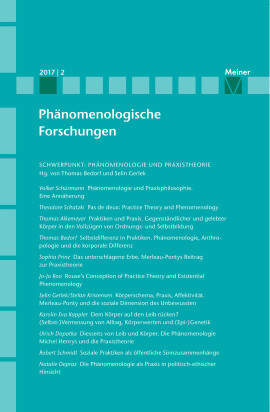
ZEITSCHRIFTENHEFT
Bd. 2017 (2017), Heft 2: Phänomenologische Forschungen 2017-2
Herausgeber:
Phänomenologische Forschungen, Bd. 2017
(2017)
In diesem Heft
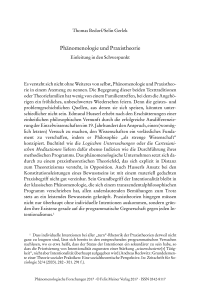
Phänomenologie und Praxistheorie
Einleitung in den SchwerpunktPhänomenologische Forschungen, Bd. 2017 (2017), Heft 2 : S. 4–7
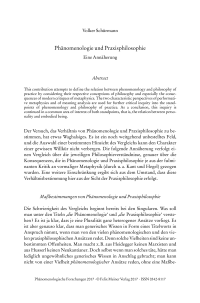
Phänomenologie und Praxisphilosophie
Eine AnnäherungPhänomenologische Forschungen, Bd. 2017 (2017), Heft 2 : S. 8–23
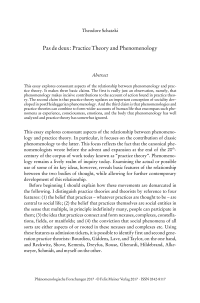
Pas de deux: Practice Theory and Phenomenology
Phänomenologische Forschungen, Bd. 2017 (2017), Heft 2 : S. 24–39
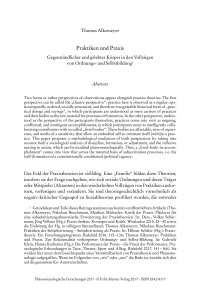
Praktiken und Praxis
Gegenständlicher und gelebter Körper in den Vollzügen von Ordnungs- und SelbstbildungPhänomenologische Forschungen, Bd. 2017 (2017), Heft 2 : S. 40–55
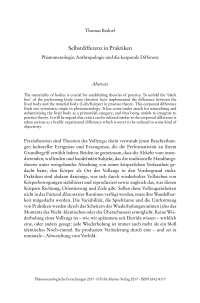
Selbstdifferenz in Praktiken
Phänomenologie, Anthropologie und die korporale DifferenzPhänomenologische Forschungen, Bd. 2017 (2017), Heft 2 : S. 56–74
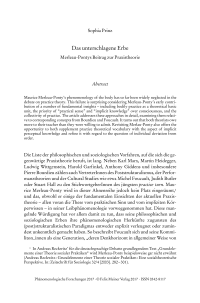
Das unterschlagene Erbe
Merleau-Pontys Beitrag zur PraxistheoriePhänomenologische Forschungen, Bd. 2017 (2017), Heft 2 : S. 76–91
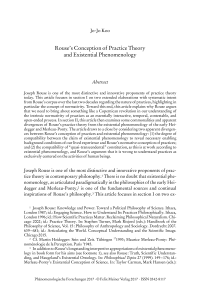
Rouse’s Conception of Practice Theory and Existential Phenomenology
Phänomenologische Forschungen, Bd. 2017 (2017), Heft 2 : S. 92–110
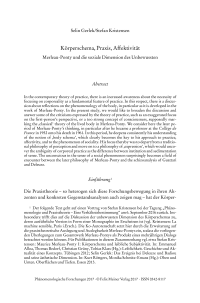
Körperschema, Praxis, Affektivität
Merleau-Ponty und die soziale Dimension des UnbewusstenPhänomenologische Forschungen, Bd. 2017 (2017), Heft 2 : S. 112–129
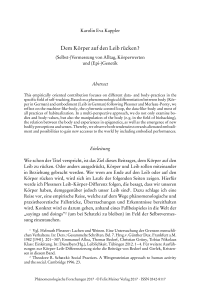
Dem Körper auf den Leib rücken?
(Selbst-)Vermessung von Alltag, Körperwerten und (Epi-)GenetikPhänomenologische Forschungen, Bd. 2017 (2017), Heft 2 : S. 130–145
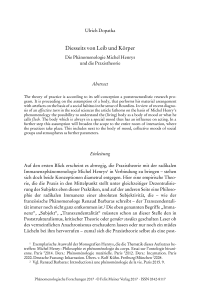
Diesseits von Leib und Körper
Die Phänomenologie Michel Henrys und die PraxistheoriePhänomenologische Forschungen, Bd. 2017 (2017), Heft 2 : S. 146–157
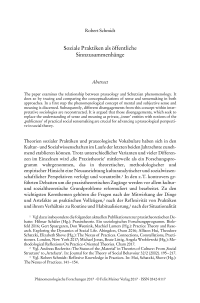
Soziale Praktiken als öffentliche Sinnzusammenhänge
Phänomenologische Forschungen, Bd. 2017 (2017), Heft 2 : S. 158–171

Die Phänomenologie als Praxis in politisch-ethischer Hinsicht
Phänomenologische Forschungen, Bd. 2017 (2017), Heft 2 : S. 172–183


 Powered by CloudPublish
Powered by CloudPublish